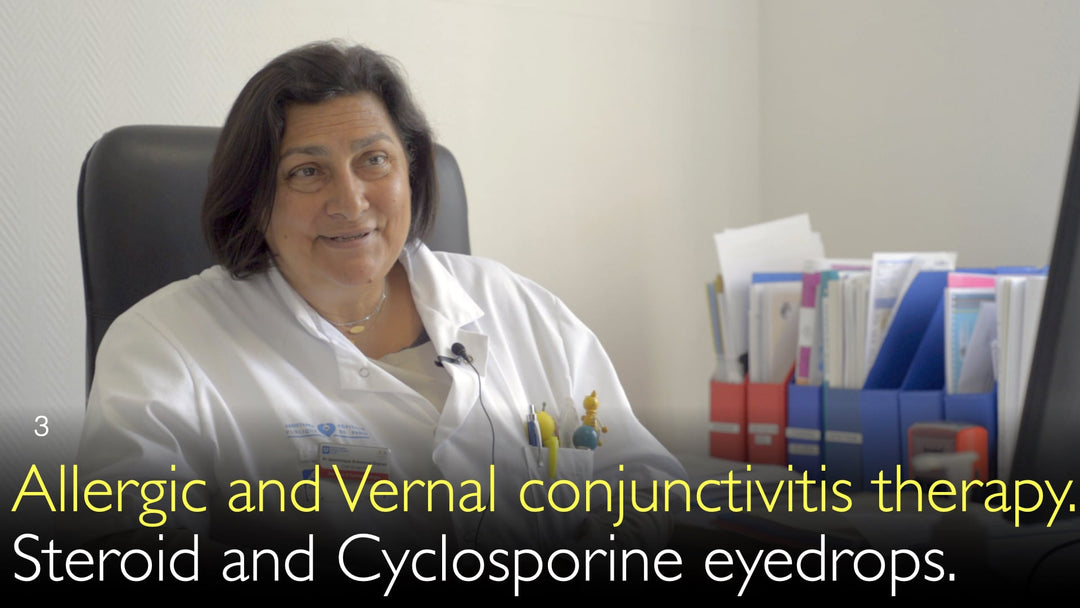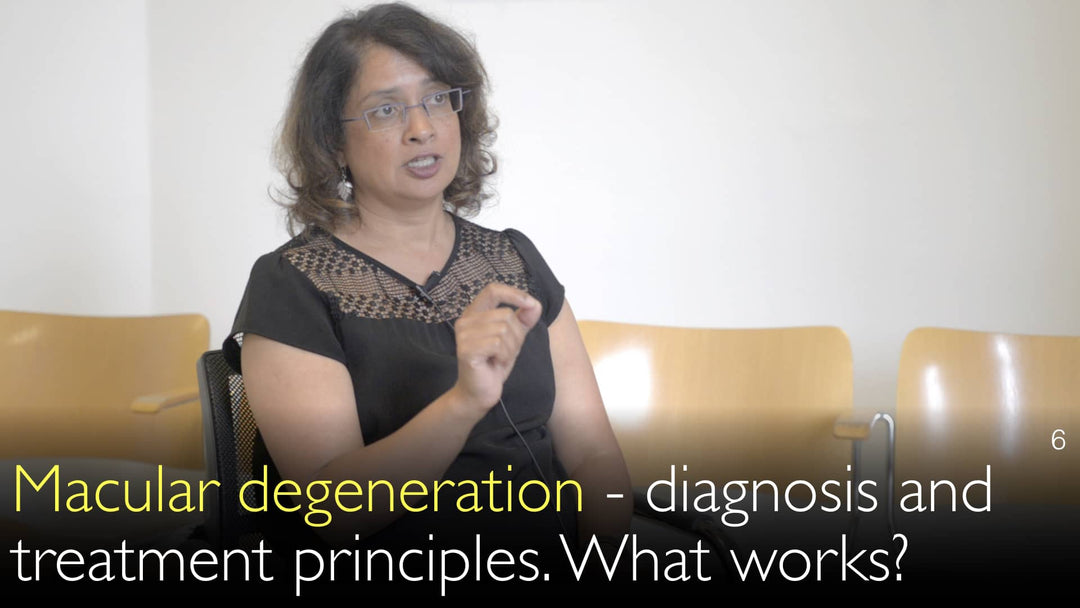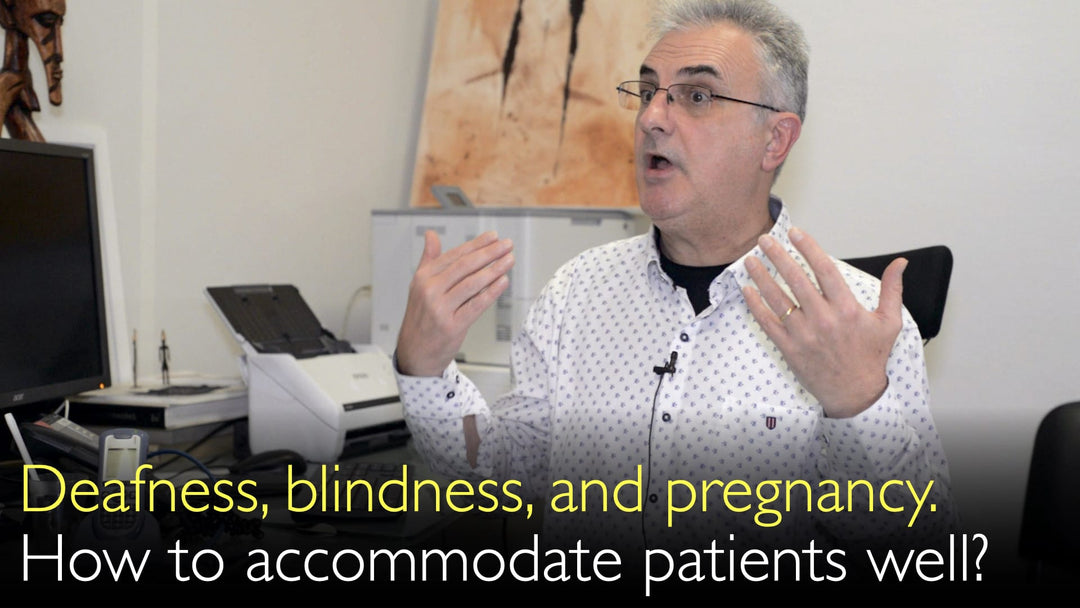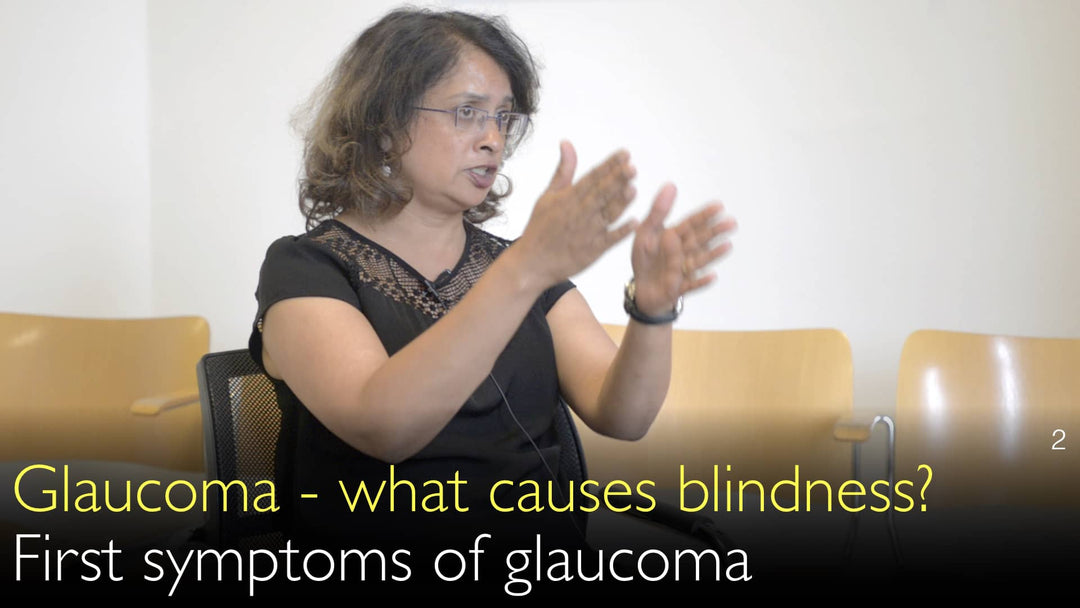Leading expert in pediatric ophthalmology, Dr. Dominique Bremond-Gignac, MD, explains effective treatments for allergic conjunctivitis and its severe forms, detailing the risks of chronic steroid eye drops and the life-changing benefits of immunomodulatory cyclosporine eye drops for improving vision and quality of life in children.
Advanced Treatments for Severe Allergic Eye Disease: Beyond Steroid Eyedrops
Jump To Section
- Understanding Allergic Conjunctivitis
- Severe Forms: Vernal and Atopic Keratoconjunctivitis
- Steroid Eyedrop Complications and Dependence
- Cyclosporine Eyedrop Treatment Development
- Impact on Quality of Life and Vision
- Future Awareness and Global Initiatives
- Full Transcript
Understanding Allergic Conjunctivitis
Allergic conjunctivitis is a frequent and increasingly common ocular pathology, largely driven by environmental factors like pollution. As Dr. Dominique Bremond-Gignac, MD, explains, large-scale studies such as the ISAAC clinical study, which involved over one million children, have documented the rise of ocular allergy and rhinoconjunctivitis. For common seasonal and perennial forms, effective pharmacological treatments include antihistamine and mast cell stabilizer eye drops.
Severe Forms: Vernal and Atopic Keratoconjunctivitis
Beyond common allergies, there are two severe forms of eye allergy in children. Vernal keratoconjunctivitis (VKC) is the more common severe form, though it is considered rare in Europe and is more prevalent in South America, Africa, and the Middle East. Atopic keratoconjunctivitis is a similar but distinct presentation, characterized by the presence of atopic dermatitis on the eyelids. Dr. Bremond-Gignac, MD, emphasizes the critical prognostic difference: VKC typically resolves by adolescence, whereas atopic keratoconjunctivitis is a lifelong condition.
Steroid Eyedrop Complications and Dependence
For decades, the primary treatment for these severe conditions was topical steroid eyedrops. While effective at providing short-term symptom relief, Dr. Dominique Bremond-Gignac, MD, details their significant risks. Chronic use can lead to serious complications, including cataracts, glaucoma, corneal ulcers, and infections like herpes. A major issue is steroid dependence, where parents continue administering the drops for relief, inadvertently leading to long-term damage. Their over-the-counter availability in some regions contributes to this problematic overuse.
Cyclosporine Eyedrop Treatment Development
A transformative advancement in treatment is immunomodulatory cyclosporine eyedrops. The journey began with Dr. David BenEzra's pioneering clinical study in 1985. As Dr. Bremond-Gignac recounts, subsequent research, including a key clinical study in 2006, eventually led to formal approval in 2018-2019. This treatment allows for daily management of severe allergic conjunctivitis, drastically reducing or even eliminating the need for steroid eyedrops and their associated complications.
Impact on Quality of Life and Vision
The introduction of cyclosporine has been life-changing for affected children. Dr. Bremond-Gignac, MD, notes that severe allergic keratoconjunctivitis is an underdiagnosed disease that severely impairs a child's vision and overall quality of life, often disrupting their schooling. With consistent cyclosporine treatment, children can recover function and comfort, especially those with VKC, who can eventually outgrow the condition without the burden of steroid-related side effects.
Future Awareness and Global Initiatives
Raising awareness for these severe ocular allergies is a current focus. Dr. Dominique Bremond-Gignac, MD, is involved with Association France Eczema, which has a dedicated section for allergic keratoconjunctivitis. There are plans to establish a dedicated awareness day in France, with the goal of expanding it across Europe and globally. This effort aims to promote better diagnosis and access to advanced treatments like cyclosporine, moving patient care beyond the limitations of steroid therapy.
Full Transcript
Dr. Anton Titov, MD: Allergic conjunctivitis is a frequent manifestation of allergy. There is a severe form of allergic conjunctivitis called Vernal keratoconjunctivitis. What are the most effective therapy options for allergic conjunctivitis? How to treat its severe form, Vernal keratoconjunctivitis?
Dr. Dominique Bremond-Gignac, MD: Very interesting questions because Vernal keratoconjunctivitis is a rare disease in Europe, probably not so in South America, Africa, or even the Middle East. Ocular allergy is a common pathology because there are environmental problems, pollution, and it increases. We have very large studies for that, for example, the ISAAC clinical study. More than one million children were studied for ocular allergy in general. Rhinoconjunctivitis was also studied.
We know that we have some effective pharmacological treatments for eye allergy, like antihistamines and mast cell stabilizers. They are useful for common seasonal and perennial ocular allergies.
Then we go to severe forms of eye allergy. There are two severe forms of eye allergy in children: Vernal keratoconjunctivitis, the most common of them but a rare eye disease in Europe, and atopic keratoconjunctivitis. It is a very similar presentation to Vernal keratoconjunctivitis, but there are some differences. The most important difference is that there is atopic dermatitis ongoing on the eyelids.
It is important to know the atopic keratoconjunctivitis form. I did this publication for that. There are differences between Vernal keratoconjunctivitis in children and atopic keratoconjunctivitis because the prognosis is different. Vernal keratoconjunctivitis ends at adolescence or in young adult years. It usually goes no more. But atopic keratoconjunctivitis lasts all the life of the child. This is very important because parents must know about the prognosis.
If we want to go to the treatment of keratoconjunctivitis, a long time ago there were only steroids. Topical steroids were effective on Vernal keratoconjunctivitis and atopic keratoconjunctivitis also. The problem is there are complications with steroids in topical form. There is a problem of cataracts, glaucoma, corneal ulcers, infections like herpes, and also steroid dependence. This is a real problem for the parents.
Usually, they give the steroid eye drops because they knew that the child would be relieved of symptoms. But if you use steroid eyedrops regularly, it will be very problematic because there will be complications and steroid dependence.
Quite a long time ago, we have another therapy for keratoconjunctivitis. The first clinical study was done by Dr. David BenEzra in 1985. They tried cyclosporine, which is the immunomodulator, as you know, generally. Cyclosporine was used in eye drops to relieve the symptoms of Vernal keratoconjunctivitis. It's a very long story.
In 2006 there was the first clinical study of cyclosporine in keratoconjunctivitis. We obtained the approval of cyclosporine in 2018 or 2019. You just look at the development of this pharmaceutical agent, and it took a long time. But cyclosporine changes completely the life of the children with atopic keratoconjunctivitis because they have cyclosporine as an everyday treatment. They need much fewer steroid eyedrops. Usually, with that, it's very good.
I'm very proud of that because it's a long way to treat children with atopic keratoconjunctivitis. Now we have an association, which is Association France Eczema in France. There is a section of allergic keratoconjunctivitis. We plan to have that in Europe. We are planning with this association to have a day of allergic keratoconjunctivitis in France, probably in Europe, and maybe one day in the world.
It's really interesting because there is a cyclosporine treatment. It's an underdiagnosed disease because for Vernal keratoconjunctivitis, children are schooled. They have a very bad quality of life and are impaired for the vision. With cyclosporin treatment, they recover. So it is very important to have a treatment for allergic keratoconjunctivitis and Vernal keratoconjunctivitis every day, and not just only steroid eyedrops.
Dr. Anton Titov, MD: You mentioned that the chronic use of steroids leads to multiple complications. But it's probably the treatment that is being overused around the world because steroid eyedrops are easy to get. Steroid eye drops are an effective short-term solution. Therefore, it gets essentially abused in a chronic form for a long time leading to all the complications. I think this is important to underscore that there have to be better treatments for Vernal keratoconjunctivitis. Cyclosporin treatment that you described is one of treatments for atopic keratoconjunctivitis.
Dr. Dominique Bremond-Gignac, MD: I agree. Steroid eye drops have been used over the counter. So it's really important to reduce the use of steroid eyedrops at the maximum. Sometimes we can eliminate the steroids and just get the treatment with cyclosporine eye drops. After that, we get to the relief of Vernal keratoconjunctivitis disease because it ends in adolescence. So that's nice.







